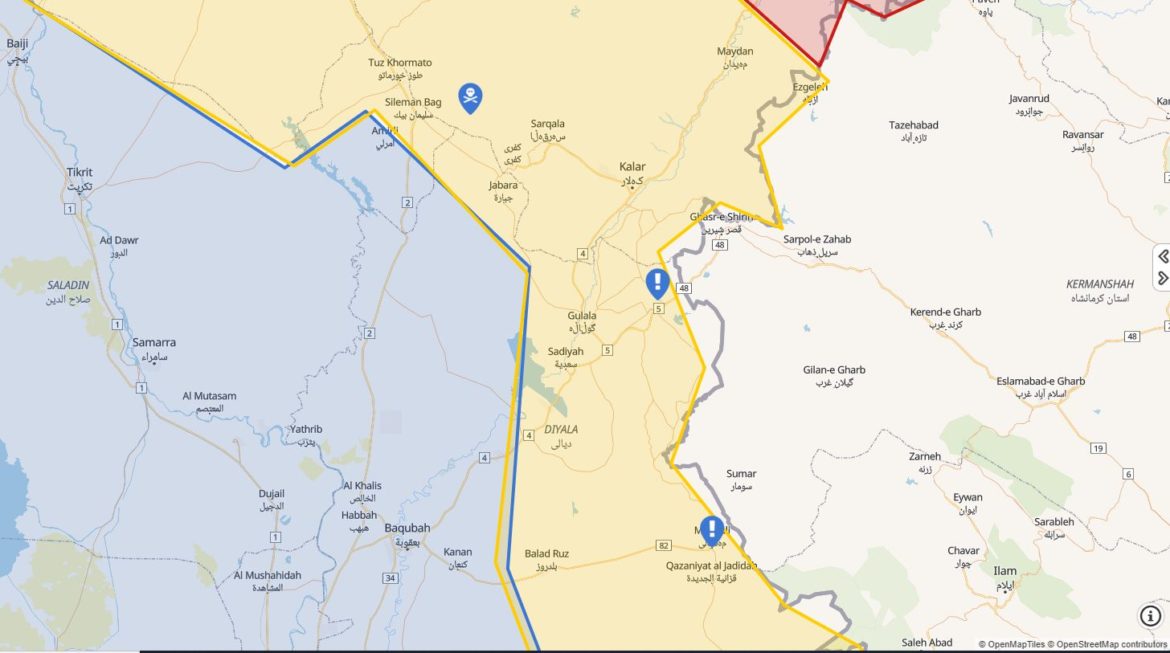1.3K
A weekly brief of events and news occurred in the disputed territories.
Kirkuk
- The Council of Representatives voted on Monday to hold provincial elections on November 6, 2023. Kirkuk’s provincial election will be its first since 2005. The Arab Council and the Turkish-backed Turkmen Front opposed the Kirkuk local council elections. The protests began in response to the Iraqi parliament repealing Article 35 of the law on the Kirkuk provincial council, which recalls all voters’ registration. The two parties worked to include the article in the upcoming elections. The election law is based on the voters’ registration c. 2021. Both Turkish-backed parties and the Arab council have been vocally opposed to Kurds and Kurdish rights, and especially to those Kurds who were forcibly displaced by the former regime and returned to the province after 2003.
- On March 22, five Peshmerga soldiers were arrested by Turkmen militias near the Perde district. The five Peshmerga soldiers of the 35th Brigade were returning from duty near the district but faced detention by militias who have controlled the area since October 16, 2017. After five hours in detention they were released by the Kirkuk police.
- On March 19, General Jabar Naima Tai, the commander of Kirkuk operations, accompanied by General Kawa Gharib, the commander of the Kirkuk police, visited the Peshmerga positions and met with Peshmerga commanders in the Qara Hanjeer district. According to a statement issued by the police, the meeting addressed the security gaps between the army and the Peshmerga and discussed the closure of secondary roads to prevent smuggling.
- On March 15, the Iraqi National Security arrested a female student at Kirkuk University for praising the former Iraqi dictator Saddam Hussein at a graduation ceremony. The girl was a final-year student at Kirkuk University’s law college. Iraqi laws criminalize hailing the former regime, resulting in the arrest of the student pending court sentencing.
- On March 15, dozens of graduates of Kurdistan Regional Government (KRG) medical colleges and universities, who are residents of Kirkuk, held a demonstration in front of the Kirkuk health building demanding employment in health institutions in Kirkuk. The graduates are residents of Kirkuk but have been denied employment because they graduated from universities in the Kurdistan Region.
Khanaqin
- On March 16, the Kurdish lawmaker Susan Mansour called for the removal of Khanaqin’s mayor and governmental administration because of “corruption”. She expressed her surprise at the decision of the local administration of Diyala province and the Council of Ministers to return Dilêr Hassan to the post of mayor and said: “[Hassan] was arrested on charges of corruption and released on bail of 500 million Iraq dinar.” Mansour warned of the potential of mass demonstrations if the mayor was not removed immediately.
- On March 12, the Iraqi Ministry of Planning approved the re-designation of the Mandali district as a district. In 1947 Mandali became a district and is considered one of the oldest districts in Iraq. In 1987 the Ba’ath Party Revolutionary Leadership Council decided to open it as a district. Recently, the first deputy speaker of the Iraqi parliament, Shakhawan Abdullah, called for the redistricting of the Mandali district in a petition.
Tuz Khurmatu
- On March 15, the Turkmen Front bloc (ITF) in parliament demanded that the Iraqi parliament approve the legal procedures for the governorship of the two districts of Tal Afar and Tuz Khurmatu. In a statement, the Turkmen Front congratulated the approval of the bill making Halabja a province. The statement said that the Iraqi Council of Ministers in 2014, approved the governorship of the districts of Tal Afar and Tuz Khurmatu, but the project has not yet been approved by the Iraqi parliament.
- On March 14, ISIS (Da’esh) terrorists released footage of the killing of a shepherd kidnapped last month in the Tuz Khurmatu district. The deceased shepherd, Ali Akbar, was kidnapped by Da’esh terrorists but was not released on a ransom, which has been the case for many kidnapping victims. On March 18, Iraqi forces conducted a large-scale operation in the villages of Palkana and Shoraw near the district. The operation was conducted with the participation of the Rapid Response Force and military intelligence without the participation of the Peshmerga forces stationed nearby. During the military operations, the Iraqi forces destroyed an archaeological site named “No Gawan,” the Nine Holes, located in the Gozeshken Valley in Palkana village, 24 kilometers from the center of Tuz Khurmatu district. According to historians, it dates back to prehistoric cave-dwelling humans. The area was demolished to prevent terrorists using it as a hideout.
Shingal (Sinjar)
- On March 18, the chairman of the Lalish center’s high committee, Saeed Jardo, called on political parties to allocate a seat for the Yazidis in the new Kurdistan parliamentary election law. The request came at a press conference held at the headquarters of the Lalsh temple in Duhok. “The Yazidis are a major indigenous community. Their presence in a national institution such as the Kurdistan Parliament is important,” said Saed. The Lalish Center for Media and Culture is considered to be the largest existing Yazidi cultural institution. The Center was established in 1993 and has 38 departments and offices in Kurdistan, Iraq, and abroad.

